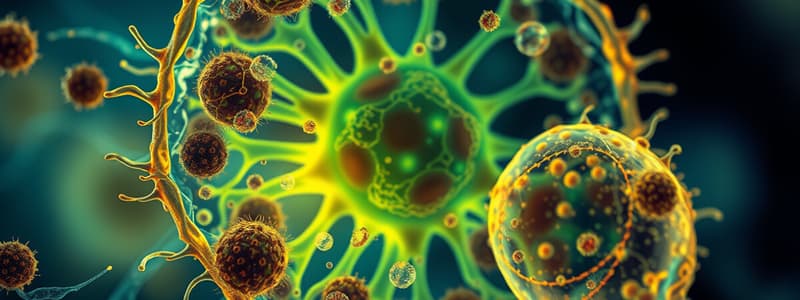Podcast
Questions and Answers
What is microbiology?
What is microbiology?
The study of microorganisms and their effects on humans and the environment.
What is the size of microorganisms generally?
What is the size of microorganisms generally?
1 millimeter or less in diameter.
Which of the following groups are included in prokaryotes?
Which of the following groups are included in prokaryotes?
- Bacteria (correct)
- Fungi
- Archaea (correct)
- Algae
Who is known as the Father of Bacteriology?
Who is known as the Father of Bacteriology?
Eukaryotes are typically smaller than prokaryotes.
Eukaryotes are typically smaller than prokaryotes.
The term microbe was used by ______ in 1878.
The term microbe was used by ______ in 1878.
What did Aristotle believe about living organisms?
What did Aristotle believe about living organisms?
What is the basis for the 5 kingdom classification proposed by RH Whittaker?
What is the basis for the 5 kingdom classification proposed by RH Whittaker?
Flashcards are hidden until you start studying
Study Notes
Introduction to Microbiology
- Microbiology studies microorganisms, a diverse group of microscopic organisms including bacteria, archaea, viruses, fungi, prions, protozoa, and algae.
- Microorganisms are defined as organisms too small to be seen clearly with the naked eye, generally 1 millimeter or less in diameter.
- This field has two main themes: understanding microbial life and applying this knowledge for human and environmental benefits.
- Microbiology explores fundamental life processes and has led to breakthroughs in medicine, agriculture, and industry.
Prokaryotes vs Eukaryotes
- Prokaryotes are simpler, smaller cells including Bacteria and Archaea; eukaryotes are larger, more complex cells with membrane-bound organelles.
- Eukaryotic microorganisms include algae, protozoa, protists, and fungi, which have various specialized functions within the cell.
Classification of Living Organisms
- Organisms have been classified into kingdoms based on various criteria, evolving from the two-kingdom system proposed by Linnaeus to a five-kingdom system by R.H. Whittaker.
- Criteria for classification include:
- Cell structure complexity: prokaryotic vs eukaryotic
- Organism complexity: unicellular vs multicellular
- Mode of nutrition: autotrophs (plants) vs heterotrophs (fungi and animals)
- Lifestyle roles: producers, consumers, decomposers
- Phylogenetic relationships: the evolutionary lineage connecting prokaryotes and eukaryotes
Major Groups of Microbes
- Historically, microorganisms were thought to arise spontaneously from non-living materials (spontaneous generation).
- Key historical figures include:
- Aristotle promoted spontaneous generation theory.
- Roger Bacon linked diseases to invisible "seeds" or "germs".
- Antony Van Leeuwenhoek, known as the Father of Bacteriology, first observed microorganisms (termed "Animalcules") using a microscope in the 17th century.
- The term "microbe" was introduced by Sedillot in 1878.
Transition Era in Microbiology
- Francesco Redi challenged the spontaneous generation theory by demonstrating that maggots do not originate from decaying meat when covered.
- John Needham, contrastingly, supported spontaneous generation, claiming that tiny organisms arose spontaneously in broth.
Studying That Suits You
Use AI to generate personalized quizzes and flashcards to suit your learning preferences.




